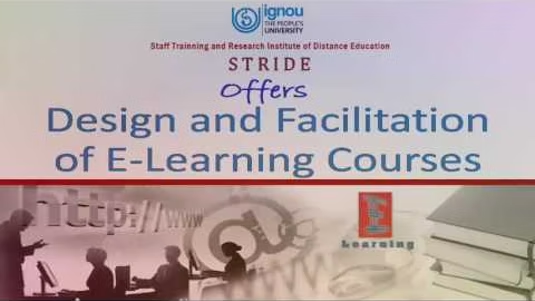Design and Facilitation of E Learning Courses free videos and free material uploaded by IGNOU Staff .
Week 1: Foundations of Learning Outcomes Study Materials Activity Assessment Able to define e-learning; understand the learning and Instructions;& Describe the learning theories. Theory into Practice Database, Available at http://tip.psychology.org/index.html Encyclopedia of Educational Technology, Available at http://coe.sdsu.edu/eet Designing Online Learning by Sanjaya Mishra. Published by the Commonwealth of Learning. Available at http://www.col.org/SiteCollectionDocuments/KS2001-02_online.pdf
Week 2: Foundations of Learning (cont..)
Behaviourism Instructional Design Course of Master of Arts (Distance Education) of STRIDE, IGNOU.
Instructional Technology: WikiBooks. Available at http://en.wikibooks.org/wiki/Instructional_Technology
Week 3: Instructional Design Models and Theories
Overview of Instructional Design
Cognitive Load Theory
Cognitive Flexibility Theory
Identifying a course and target audience (with need assessment) Finalising the course and the target audience and their level
Week 4: Instructional Design Models and Theories (cont..)
4C-ID Model
ASSURE Model
ADDIE Model
Dick and Carey Model
Collaborative Learning
Identifying the instructional design model for the selected course finalising the instructional design model for the selected course
Week 5: Instructional Design Models and Theories (cont..)
Collaborative Learning
Scenario-Based Learning
Problem-Based Learning
op Down and Bottom up models in curriculum Development
Designing the learning environment for the selected course finalising the learning environment for the selected course
Week 6: Instructional Design Processes
Blooms Taxonomy
Gagne’s Nine principles of ID
Learners and Learning Styles
Should we be using Learning Styles? What research has to say to practice.Available at http://www.lsda.org.uk/files/PDF/1540.pdf
Designing learning outcome for the selected course finalising learning outcome for the selected course
Week 7: Instructional Design Processes(cont..)
Vygotsky: Language of thought
Banner-Memory and learning
Learning Objectives
Week 8: Computer Mediated Communication
Concept Mapping
Tools for Concept Mapping
Technology Analysis for e-Learning
www.freemind .com
Designing concept map for the selected course finalisingconcept map for the selected course
Week 9: Collaborative Learning
Synchronous Online Learning and Tools for Synchronous Learning
Asynchronous Online Learning and Tools for Asynchronous Learning
144 Tips for Synchronous E-Learning: Strategy+ Research, Ed by Bill Brandon. Published by the eLearning Guild in 2008. Available at http://www.elearningguild.com/content.cfm?selection=doc.1025 Critically analysis the Collaborative learning Assignment
Week 10: Collaborative Learning(cont..)
Instructional support for collaborative learning
Evaluation of Learning
Structuring the online course
Curtis, D.D., & Lawson, M.J. (2001). Exploring Collborative Online Learning, Journal of Asynchronous Leanring Networks, 5 (1), Available at http://www.aln.org/publications/jaln/v5n1/pdf/v5n1_curtis.pdf
Smith, B.L., &McGreagor, J.T. What is Collborative Learning? Available at http://learningcommons.evergreen.edu/pdf/collab.pdf
Structuring the selected course finalising the structure of the selected course
Week 11: Activities of Online Learning
Online Tutoring: Skills and Competencies of Online Tutors
e-Moderating, The Five Stage Model for Online moderation
R2D2 (Read, Reflect, Display, Do) Model
Online Tutoring eBook. Ed by Carol A. Higgison. Available at http://web.archive.org/web/20071212221227/otis.scotcit.ac.uk/onlinebook/
Nachindila, B. (2007). The role of tutors in teaching of Online English for Business programmes in South Africa: A Case study, MERLOT Journal of Online Teaching and Learning, 3 (4), Available at http://jolt.merlot.org/documents/nchindila.pdf
Week 12: Activities for Online Learning (cont..)
Assessment and Evaluation
Case studies
Page: E-Moderating (2004) Ed 2. by Gilly Salmon. Published by Kogan London.
E-tivities (2002) by Gilly Salmon. Published by Kogan Page: London.
Empowering Online Learning (2008) by Curtis J. Bonk and Ke Zhang. Published by Jossey Bass: San Francisco.
E-Learning Groups and Communities by David McConnell, (2006). OU Press/ McGraw Hill Education: Berkshire.
This course describes the foundations, processes, models and theories and instructional design in practice that have evolved from the basic systemic approaches for e-learning environment. Keeping in view the need of the learners, teachers and practitioners of e-learning, this course is planned, designed and developed to acquaint them with the design aspects of Instructional Design. This course is run over 12 weeks and requires 3 to 5 hours of time in each week. Learners will learn from video programmes of subject matter experts, web resources and pdf/ppt contents and also from peer interaction. Activities like quizzes, participation in discussion forums and short assignments helps the learners for better understanding of concepts. After completions of all required activities, learners will receive course completion certificate.

- 0 Reviews
- 0 Students
- 156 Courses

Write a public review